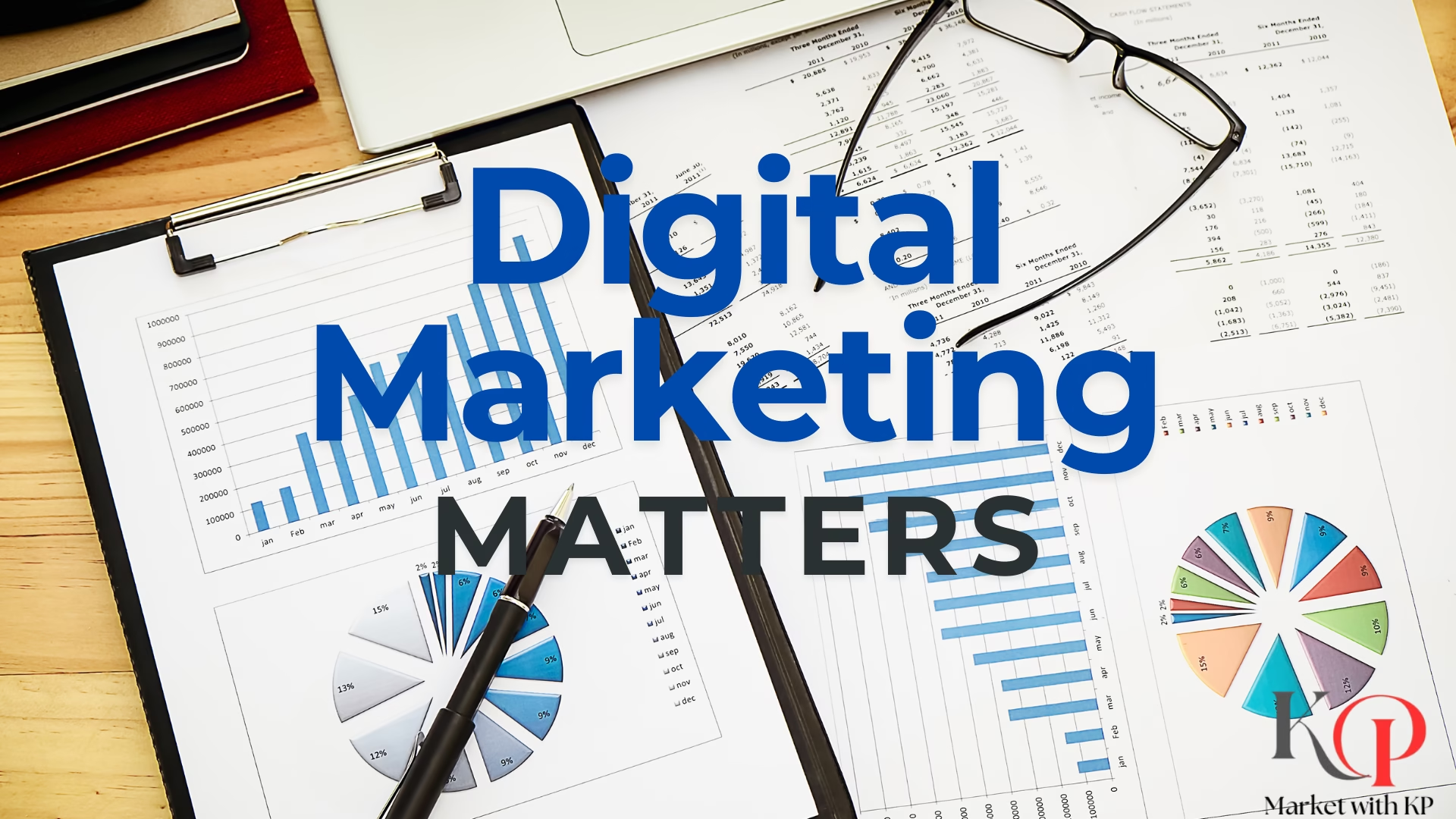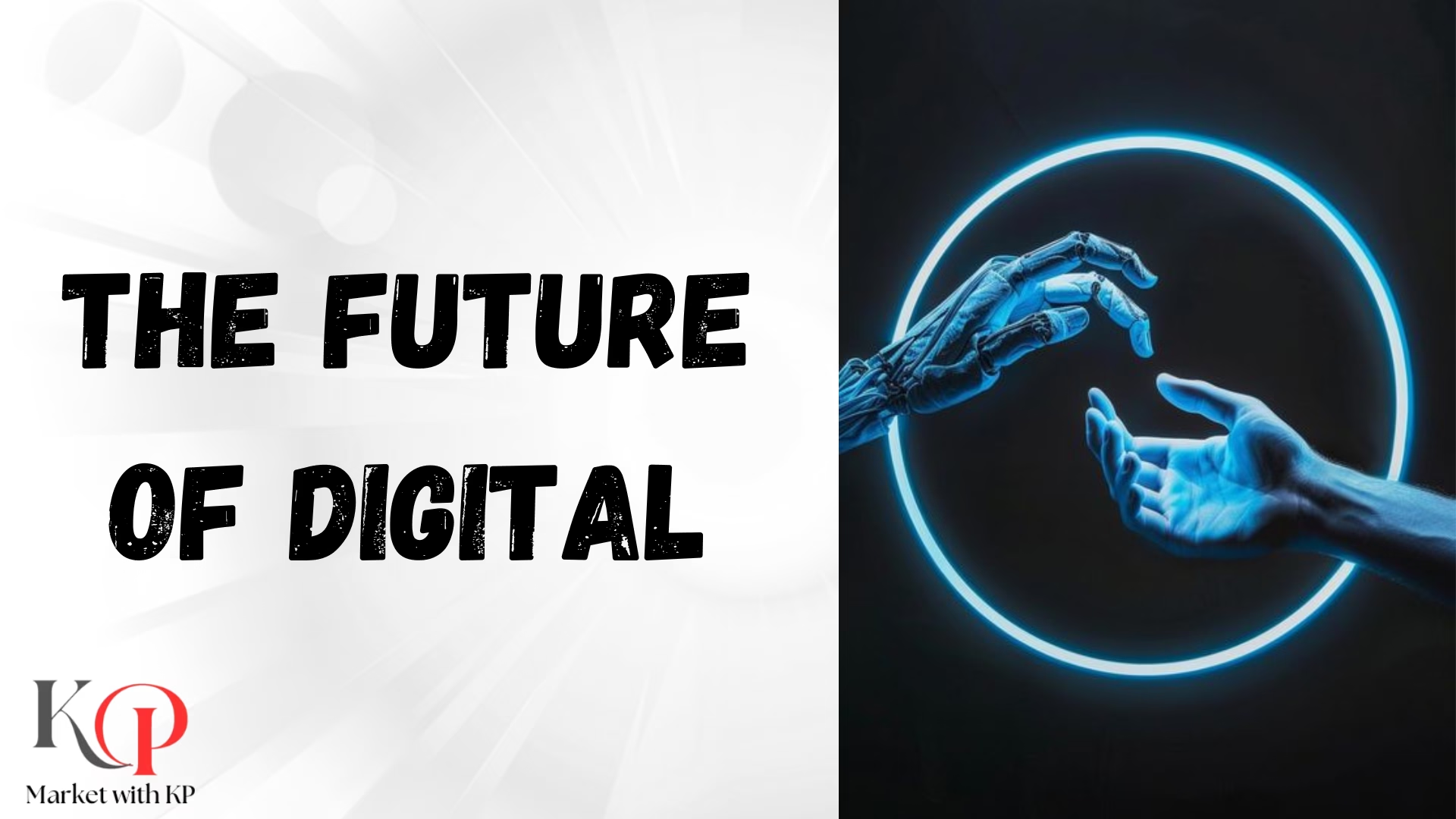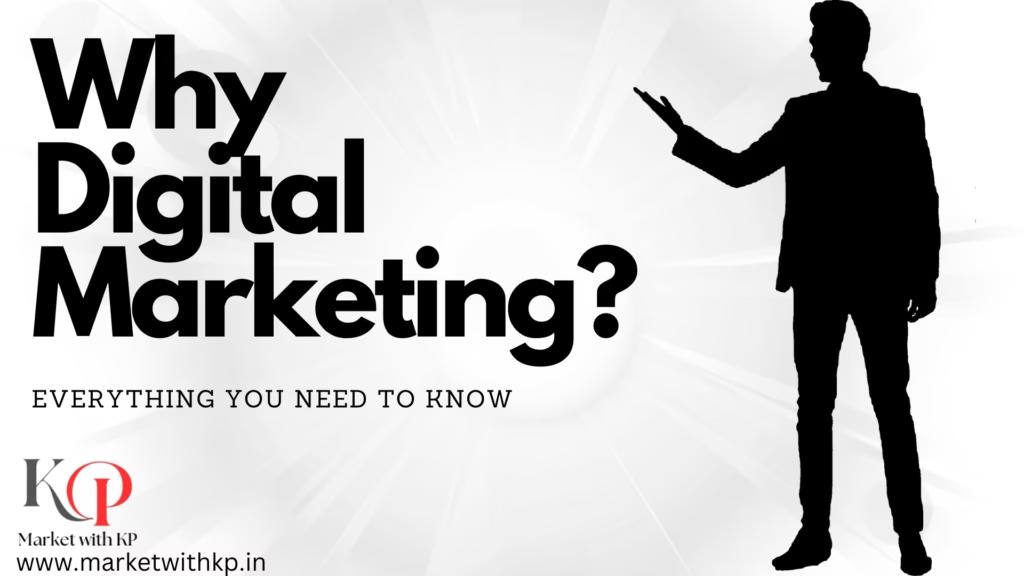Why Digital marketing has emerged as an indispensable tool in today’s business landscape. With the rapid advancement of technology and the proliferation of internet access, businesses now have the opportunity to connect with their target audience like never before. But what exactly is digital marketing, and why is digital marketing so important? This comprehensive guide will walk you through the core concepts, strategies, and benefits of digital marketing, giving you the tools to understand its significance and implement it effectively.

What is digital marketing?
Digital marketing encompasses all marketing efforts that use an electronic device or the internet. Businesses leverage digital channels such as search engines, social media, email, websites, and mobile apps to connect with prospective and current customers. Unlike traditional marketing, digital marketing provides measurable, targeted, and interactive ways to reach audiences.

Some common examples of digital marketing include:
- Search Engine Optimization (SEO): optimizing a website to rank higher on search engine results pages.
- Content Marketing: Creating valuable content to attract, engage, and convert an audience.
- Social Media Marketing: Promoting products or services on platforms like Facebook, Instagram, and LinkedIn.
- Email Marketing: Sending personalized emails to nurture leads and maintain customer relationships.
- Pay-Per-Click (PPC): running paid ads that appear on search engines or social media.
The Importance of Digital Marketing

1. Global Reach
The use of digital marketing is superior to traditional methods, as it can transcend geographical boundaries and bring your business to the fingertips of anyone who has access to the internet, similarly to traditional methods, which may have geographical limitations.
2. Cost-Effectiveness
Compared to traditional advertising methods like TV, radio, or print, digital marketing is far more cost-effective. Small businesses and startups can compete with larger companies by utilizing affordable strategies like social media marketing or email campaigns.
3. Measurable Results
Digital marketing allows you to track your efforts in real-time. Tools like Google Analytics, SEMrush, and HubSpot offer insights into your campaigns’ performance, enabling you to refine strategies and maximize ROI.
4. Targeted Audience Engagement
With digital marketing, you can tailor your message to specific demographics, locations, and even behaviors. This ensures your marketing efforts resonate with the right people, increasing conversion rates and customer satisfaction.
5. Flexibility and Adaptability
Digital marketing is incredibly versatile. From video ads and blog posts to social media contests and influencer collaborations, the possibilities are endless. Additionally, campaigns can be adjusted quickly based on performance data, ensuring ongoing improvement.
Core Strategies in Digital Marketing

1. Search Engine Optimization (SEO)
SEO is the foundation of a successful digital presence. It involves optimizing your website to improve its ranking on search engines like Google and Bing. Key elements of SEO include:
- Keyword Research: Identifying the terms your audience uses to search for your products or services.
- On-Page Optimization: Improving meta descriptions, headers, and content quality.
- Off-Page SEO: Building backlinks and increasing domain authority.
2. Content Marketing
Content marketing focuses on creating and distributing valuable content to attract and retain a clearly defined audience. Types of content include:
- Blog posts
- E-books
- Infographics
- Videos
- Webinars
The goal is to provide value and establish your brand as a trusted authority in your industry.
3. Social Media Marketing
Social media platforms are powerful tools for engaging with your audience, building brand awareness, and driving sales. Each platform caters to different audiences:
- Facebook: Ideal for B2C businesses with diverse demographics.
- LinkedIn: Best for B2B companies and professional networking.
- Instagram: Perfect for visually driven industries like fashion, food, and travel.
4. Pay-Per-Click Advertising (PPC)
PPC advertising allows businesses to place ads on search engines or social media platforms and pay only when users click on them. Google Ads and Facebook Ads are popular PPC platforms. The key to PPC success is thorough keyword research and compelling ad copy.
5. Email Marketing
Email marketing remains one of the most effective digital marketing strategies. Personalized email campaigns can nurture leads, encourage repeat purchases, and keep your audience informed about new offerings.
Tools and Technologies in Digital Marketing

1. Analytics Tools
- Google Analytics: Monitors user behavior and website traffic.
- SEMrush: provides information on SEO performance insights and competitor analysis.
2. Social Media Management Tools
- Hootsuite: Schedules posts and monitors engagement across platforms.
- Buffer: simplifies social media content planning.
3. Email Marketing Platforms
- Mailchimp: User-friendly for small businesses.
- Constant Contact: offers automation and detailed analytics.
4. Content Management Systems (CMS)
- WordPress: flexible and widely used for blogs and websites.
- HubSpot: Integrated tools for content marketing and lead generation.
The Future of Digital Marketing

Digital marketing is constantly evolving. As technology advances, marketers need to stay ahead of trends to remain competitive. Some emerging trends include:
1. Personalization at Scale
Personalization has been a cornerstone of effective marketing for years, but the future will take it to new heights. Advanced data analytics and artificial intelligence (AI) will allow brands to deliver hyper-personalized experiences to consumers. From personalized product recommendations to tailored content and email campaigns, marketers will leverage AI to understand individual preferences and behaviors.
For example, Netflix and Spotify already use AI algorithms to recommend content based on user preferences. In the future, this level of personalization will extend to other industries, enabling businesses to create one-to-one marketing experiences at scale.
2. Artificial Intelligence and Automation
AI will play a pivotal role in shaping the future of digital marketing. From chatbots that provide instant customer service to AI-driven content creation tools, automation will streamline marketing processes and improve efficiency.
Marketers will increasingly rely on AI for predictive analytics, enabling them to anticipate consumer needs and trends. Tools like Google Analytics 4 and Adobe Analytics are already incorporating AI to provide deeper insights into customer journeys. As these technologies advance, marketers will gain a more granular understanding of their audiences, leading to more effective campaigns.
3. Voice Search Optimization

With the rise of smart speakers like Amazon Echo and Google Home, voice search is becoming a significant aspect of consumer behavior. By 2025, it is estimated that more than 75% of households will own a smart speaker. This shift necessitates a new approach to search engine optimization (SEO).
Marketers will need to optimize their content for natural language queries and focus on long-tail keywords that reflect conversational speech. Voice search also emphasizes the importance of local SEO, as many voice queries are location-specific.
4. The Metaverse and Virtual Experiences
The metaverse—a collective virtual shared space—is poised to revolutionize how brands interact with consumers. Platforms like Roblox, Decentraland, and Meta’s Horizon Worlds are creating new opportunities for immersive brand experiences.
For instance, brands can host virtual events, launch digital products, or create branded virtual spaces. Gucci’s virtual sneakers launch and Fortnite’s in-game concerts are early examples of how marketers can engage with audiences in the metaverse. As technology advances, these experiences will become more sophisticated and integral to digital marketing strategies.
5. Data Privacy and Ethical Marketing
As consumers become more concerned about data privacy, regulations like the General Data Protection Regulation (GDPR) and California Consumer Privacy Act (CCPA) are reshaping the digital marketing landscape. The future of digital marketing will require a balance between personalization and privacy.
Marketers will need to adopt transparent data practices and prioritize consumer consent. First-party data—information collected directly from customers—will become increasingly valuable. Building trust through ethical marketing practices will be crucial for long-term success.
6. Video Content Dominance
Video content continues to dominate online platforms, and its importance will only grow in the future. Short-form videos, popularized by platforms like TikTok, Instagram Reels, and YouTube Shorts, are highly engaging and shareable. Brands will need to adapt their strategies to create compelling video content that captures attention within seconds.
Live streaming is another area with immense potential. Platforms like Twitch and YouTube Live allow brands to connect with audiences in real-time, fostering a sense of community and authenticity. Interactive video content, such as shoppable videos, will also become more prevalent, blending entertainment with e-commerce.
7. The Rise of Influencer Marketing

Influencer marketing is evolving from a trend to a staple in digital marketing strategies. Micro-influencers and nano-influencers, with smaller but highly engaged audiences, will become increasingly valuable for brands looking to build authentic connections.
In the future, influencer marketing will be more data-driven, with AI tools helping brands identify the right influencers and measure campaign effectiveness. Additionally, the rise of virtual influencers—computer-generated characters with realistic personas—will add a new dimension to influencer marketing.
8. Sustainability and Purpose-Driven Marketing
Consumers are increasingly drawn to brands that align with their values, particularly in areas like sustainability and social responsibility. Purpose-driven marketing will play a significant role in the future as businesses highlight their commitment to environmental and social causes.
Brands like Patagonia and Ben & Jerry’s have already set the standard by integrating their values into their marketing efforts. Moving forward, authenticity will be key; consumers can easily spot insincere or superficial campaigns.
9. Augmented Reality (AR) and Virtual Reality (VR)

AR and VR technologies are becoming more accessible, offering innovative ways for brands to engage with audiences. AR, in particular, has found applications in e-commerce, where consumers can virtually try on products or visualize furniture in their homes before making a purchase.
VR, while still in its early stages, offers immersive experiences that can be used for storytelling, training, and experiential marketing. As these technologies become more mainstream, they will offer unique opportunities for creative and interactive campaigns.
10. Blockchain and Decentralized Marketing
Blockchain technology has the potential to disrupt traditional digital marketing models. With its decentralized nature, blockchain can enhance transparency, combat ad fraud, and provide more control over data ownership.
For example, blockchain can enable consumers to monetize their data by sharing it directly with advertisers in exchange for rewards. It can also ensure the authenticity of influencer partnerships and digital ad impressions. While still nascent, blockchain’s applications in marketing are worth monitoring.
Conclusion
Digital marketing is no longer optional—it is essential for any business aiming to thrive in today’s digital-first world. By understanding its components and leveraging the right tools and strategies, businesses can not only reach but also engage and convert their target audience effectively.
Whether you’re a seasoned marketer or a business owner new to the digital space, investing in digital marketing is investing in the future of your business. So take the leap, explore the possibilities, and watch your brand soar to new heights.


JSR Global Sales Company, established in 2020, is a leading expansion tank manufacturer in India, based in New Delhi. We specialize in designing and producing high-quality expansion tanks for a variety of industrial, commercial, and residential applications. As a top air vessel supplier in Delhi NCR, we are trusted across New Delhi, Delhi NCR, and throughout India for the durability, reliability, and performance of our products. Whether you’re looking for custom expansion tanks for HVAC systems or standard models for other industrial uses, we provide tailored solutions to meet your needs.
https://expansiontankmanufacturer.com/
Established in year 2017, We are feeling very happy to introduce our venture Sparvit with wide range of Sanitaryware products, Brass CP Fittings and accessories etc. Spar India has made a well-recognized name as a Manufacturer of complete bathroom sanitary wares and more. We have achieved expertise in catering to the requirements of our clients exactly as per their needs. We emphasize on stringent quality standards in order to ensure that the products provided to our clients is always optimum to its level. Our USP is our after sale services.
https://sparvitsanitaryware.com/
Welcome to Rollick Sports Surface, your trusted partner in high-quality sports flooring solutions. With years of expertise in manufacturing and retail, we provide top-tier synthetic and wooden sports flooring for various indoor and outdoor sports facilities. Our commitment to quality and precision ensures durable, safe, and high-performance sports surfaces.
https://rollicksportssurface.in/
At Gaas Industries, we are a top exporter and global leader in supplying high-quality medical imaging consumables, including X-ray films, ultrasound paper rolls, laser imaging films, and thermal X-ray films. As a trusted exporter, we provide certified and reliable products that meet the needs of healthcare providers, diagnostic centers, and medical institutions globally. Our commitment to delivering premium-quality medical imaging consumables, coupled with competitive pricing and fast global delivery, has made us the best exporter of X-ray films and other diagnostic imaging supplies.
https://xrayfilmsupplier.com/
At MK Plast, a top manufacturer in India, we provide high-quality urine containers in Delhi, sharps containers Supplier, and specimen containers Manufacturer in Delhi NCR for hospitals, clinics, and labs across Delhi NCR and India. As the best manufacturer of medical-grade containers, our products ensure durability, hygiene, and accuracy, meeting the highest healthcare standards.
https://urinecontainermanufacturer.com/
Established in 2020, JSR Global Sales Company specialized in offering all types of Strainers and Valves. We are the most reputed Manufacturer and Supplier of all types of Pipeline Equipments. We offer various types of Strainers and Valves for every Industry. Our Products are widely used by Industries involved in process of liquid materials such as Fluids, Petroleum, Water, Chemicals, Pulps, etc. Some of our widely used products including Suction Guide, Expansion Tank and Balancing Valve are made to give their service.
https://jsrglobalsales.com/
Looking for best amazon research tools? Here is the complete guide: https://bit.ly/Amz-Sales-Tool-Guide
25 Easy Steps To Make Your Website Faster – https://digitalfinds.reviewfriendly.com/make-your-website-faster/